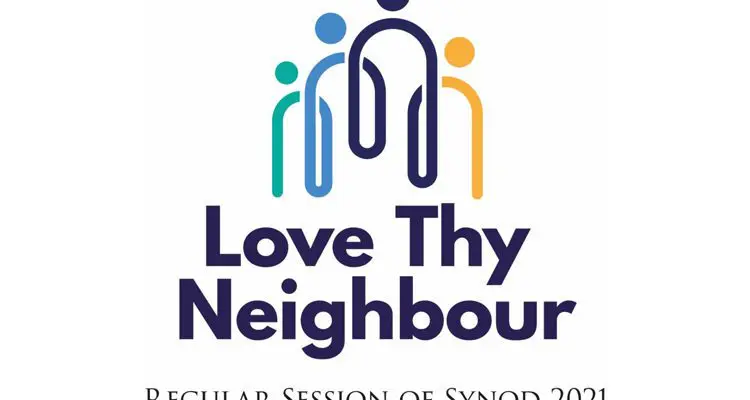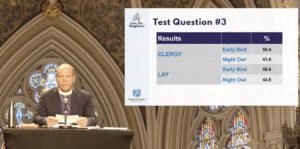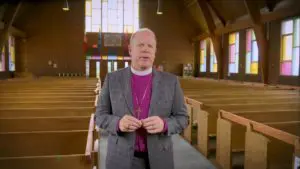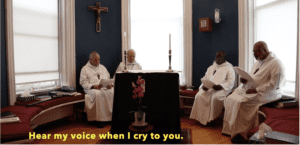
The Diocese of Toronto’s 160th Regular Session of Synod is being held Nov. 25-27 online. The theme of Synod is “Love Your Neighbour.” St. Paul writes to the Galatians, “And let us not grow weary of doing good, for in due season we will reap, if we do not give up.” To the Corinthians, he writes, “Let all that you do be done in love.” Here are the highlights of the first day of Synod, in chronological order. See the highlights from day 2.
Synod begins with Eucharist
Synod began on Nov. 25 at 7 p.m. with a Eucharist, which was live streamed from St. James Cathedral. Despite early technical difficulties, nearly 400 people joined the service from their homes. It included a penitential rite lamenting the Church’s past wrongs against Indigenous peoples. Many of the musical pieces were pre-recorded by choirs and musicians from parishes across the diocese. Watch the Eucharist online.
Bishop gives Charge to Synod
During the Eucharist, Bishop Andrew Asbil gave his Charge to Synod. Using the story of the Good Samaritan, he spoke about sharing agape love with one’s neighbour, especially during the COVID-19 pandemic. “The Anglican Church in the Diocese of Toronto has stepped into this wilderness with a sense of enthusiasm, on adrenaline and on instinct, to serve,” he said. His charge touched on a number of subjects, including the ways in which we are called to show God’s love in the world, the need to discern where God is calling us into the future, and a call to generosity in stewardship.
FaithWorks celebrates 25th anniversary
After the Eucharist, Synod watched a series of videos celebrating FaithWorks and the work of its ministry partners over the past 25 years. The diocese was encouraged to meet the 100%+1 challenge: every parish participating in this year’s campaign, and every parish setting a goal exceeding its 2020 result by at least 1%.
Business of Synod begins with worship
Synod reconvened online on Nov. 25 at 9:45 a.m. with Morning Prayer led by the Bishop’s Committee on Intercultural Ministry.
Synod thanks sponsors
Synod thanked the presenting co-sponsors, Burgundy Asset Management and Canso Investment Council.

Members practice electronic voting
Synod members learned how to vote electronically through the online event platform. They were given instructions and took part in a few test polls to practice. A test vote revealed that a majority of both clergy and lay members considered themselves early birds rather than night owls.
Diocese commits financial support to reconciliation with Indigenous peoples and communities
Synod overwhelmingly passed a motion that recognized the diocese’s commitment to the work of reconciliation with Indigenous peoples and communities and committed up to the 10% tithe from the Ministry Allocation Fund to further support and engage in that work of reconciliation, between now and the end of 2026. The Ministry Allocation Fund is sourced by selling properties in the diocese. The tithe of that fund is already set aside every year to spend on projects outside normal diocesan operations.
Discussion before the vote raised the issue of the commodification of land as a limited understanding of what land means, perpetuating the structures that led to Indigenous displacement in the first place. Speakers raised the possibility of spiritual covenants and spiritual support with Indigenous peoples.
Missional & Outreach Moment #1
Throughout Synod, members are hearing about how the diocese is living out its vision in the Missional & Outreach Moments – how communities are moving beyond their walls to find new ways of meeting people who are not being reached by traditional forms of Church, and how our churches are reaching out to the poor, the marginalized and the homeless.
In the first Missional & Outreach Moment, Synod heard from Holy Family, Heart Lake in Brampton about how it was able to pivot during the pandemic, grapple with technology and take care of its seniors. The parish had relied on Zoom and emails to connect with its members, but they realized it wasn’t enough. With a significant senior population trying to grapple with new technology, the parish founded a technical support team and help line to offer support to the parish’s senior members. A Reach Grant allowed the parish to provide devices to some seniors, and all of the seniors’ ministry programs were able to run online. From a modest beginning of 22 parishioners worshipping online, Holy Family is now averaging 60-70 people in its online congregation. As the parish transitions to a hybrid model of worship, it prays for the grace of God to forge ahead.
Diocesan Council’s report received
Synod received Diocesan Council’s Report to Synod, which can be found in Section B of the Convening Circular. This report contains a list of council members, council’s response to the COVID-19 pandemic, a summary of all policy and major items discussed or approved by council, and a summary of diocesan grants, loans and other funding. It also includes reports on single-use plastics, affordable housing, the Diocesan Environmental Plan and investments.
Bishop’s Committee on Healing gives update
The committee told Synod what has been happening since it was formed in 2019. It represents lay and ordained health care chaplains, faith community nurses, lay anointers, lay pastoral visitors and seniors’ ministry. The committee is chaired by the Rev. Canon Joanne Davies and provides speakers for parishes, area days and workshops on a variety of topics related to healing in the Church. It provides resources on its Facebook pages for healing ministry and seniors ministry. You can read the committee’s full report in Section B of the Convening Circular.
Missional and Outreach Moment #2
Synod heard from St. Olave, Swansea, which shared its online worship, online ministry and live streaming journey. The parish didn’t have a plan; it just set up a camera and started recording, with its clergy using their smartphones to record the services as a series of separate clips and parishioners recording themselves reading lessons. People responded enthusiastically, including members of the community who couldn’t attend church in-person even before the pandemic. Video offerings expanded to include the history of the parish, art variety shows, children’s ministry and even a wedding. The parish was blown away when its 2021 Lenten education series earned 35,000 views. St. Olave’s began to see the possibilities of a new way of parish ministry. Technology allowed the parish to keep people connected to the liturgy and sacred space – St. Olave’s without borders. With a grant from the diocese and encouragement from nearby All Saints, Kingsway, the parish bought a new computer and camera and learned how to start live streaming services. “Our parish, like our imagination, knows no bounds.”

Bishop to form Episcopal Leadership Implementation Team
Bishop Andrew Asbil provided an update on episcopal leadership in the diocese. In 2020, Bishop Asbil formed the Episcopal Leadership Working Group to consider and report to him on alternative models for the exercise of episcopal leadership, oversight and pastoral ministry. In 2021, Anglicans participated in town hall meetings to provide their feedback.
Having considered the recommendations and feedback, Bishop Asbil announced that the diocese will move forward with three bishops: one diocesan bishop and two suffragan bishops. Suffragan bishops won’t necessarily be appointed to geographic areas, but will engage in ministry to the entire diocese. He will appoint as many as six to eight territorial archdeacons who will offer administrative oversight to two or three deaneries each.
Bishop Asbil will strike an Episcopal Leadership Implementation Team to create a job description for territorial archdeacons, a selection and training process, and a timeline and communications strategy for these structural changes. The co-chairs of the implementation team are Susan Abell, ODT and the Rev. Stephen Kirkegaard. Watch the presentation to Synod.
Governance changes to move forward
Synod approved motions dealing with the Constitution and Canons that will allow changes to be made to the diocese’s governance structure. The changes to the governance structure will be undertaken during a two-year pilot project. The changes will include:
- Diocesan Council and Executive Board will be amalgamated into one body called Synod Council.
- The size of Synod Council will include 25-27 members.
- Five committees will be established: Audit Committee, Finance Committee, Property Committee, Human Resources Committee, and Risk and Governance Committee.
- Existing committees will be amalgamated.
- The committees will have decision-making authority delegated to them with parameters established by Synod and Synod Council.
Questions involved how members of Synod Council will be sought, how program committees will fit into the proposed governance structure, and when the committee will report back to Synod. After the two-year pilot, there will be a 75% threshold needed to either make these changes permanent or to revert to the old structure.
Synod approved changes to the Constitution first considered in 2019. Then Synod approved Canonical changes. A third motion approved the Governance Pilot Project first considered at the last session of Synod, with the following amendments based on feedback since 2019:
- All members of Synod Council will need to be members of Synod. If not currently, the bishop can make them members of Synod under s.3(4) of the Constitution of the Diocese of Toronto, provided they are qualified under s.3(1)(a)(b)&(c) of the Constitution.
- All elected members of Council will be elected at Synod, rather than at Pre-Synod meetings.
- A carefully considered slate of nominees will be presented by the nominating committee, ensuring robust elections and a diverse group of candidates.
- The proposed model addresses possible changes in episcopal leadership and episcopal areas of the Diocese.
- The committee chairs and up to five others will be appointed by the bishop, taking into consideration skills, abilities and the diversity (geographic, gender, age, theological and BIPOC) of the Diocese.
- The bishops and those whom the diocesan bishop appoints to Council will together not hold a majority of votes (45.83%) with three bishops; 48% with four bishops; 50% with five bishops).
The pilot project will continue for two years, with a report back to Synod next year.
Missional & Outreach Moment #3
All Saints, Collingwood shared how it has stepped up and responded to community needs during the pandemic. The church’s weekly Friendship Dinner started many years ago. In March 2020, when in-person dinners were no longer possible, the parish decided to do take-out meals instead. The first take-out dinner held on April 1, 2020, gave out 65 meals. By October 2021, the team was giving out 220 take-out bags. But they saw that it wasn’t enough. Under-served people in the community were wondering what to do for food in between meals, especially as other churches weren’t holding their own dinners. All Saints developed Entrees to Go, handing out about 100 frozen entrees each week. The parish sees this as a vital ministry in its community, where there is so much need. “The church and community are hand-in-hand, and they have to continue that way.”
Synod approves constitution and canon, housekeeping changes
Synod voted to change Canon 15 to broaden the scope of how churchwardens are permitted to make payments, taking into account the modern reality of electronic transfers and credit cards.
Missional & Outreach Moment #4
St. Margaret, New Toronto described how its ministries expanded during the pandemic. When COVID-19 struck, the parish became a better neighbour, and its outreach ministries expanded beyond its imagination. With its own programs on hold, the parish got permission to redirect people to a community health centre and the Salvation Army, which were equipped to provide take-out hot meals. A group of local agencies got together and started to coordinate services and connect with each other, with leadership and coordination offered by the United Way and the City of Toronto. The Rev. Jacqueline Daley was invited to participate in this South Etobicoke Cluster. The group identified a need for a drop-in to give those most at risk access to hot meals, showers, laundry, and space to rest and get warm. St. Margaret’s became the home of this new drop-in. The parish’s new relationships with community partners and agencies have inspired its members to do more than they could ask or imagine.
Election of Synod Council, General Synod members
Because Synod voted to approve the Governance Pilot Project, Synod needed to elect five clerical and five lay members of the new Synod Council. Synod also selected seven clergy and seven lay members to serve at General Synod, which will be held in 2022. The results of these elections will be announced on Saturday.
Members raise issues, causes
During Members’ Time, members spoke about several issues and causes, including:
- Nuclear disarmament and the Nuclear Test Ban Treaty
- Fossil fuel divestment
- Geared-to-income housing
- The need to re-engage and make connections face-to-face in the community post-pandemic
- The lack of COVID-19 vaccinations in other parts of the world while Canadians are receiving third shots
- The Toronto Children’s Ministry Conference
- Thanks to the behind-the-scenes team for putting together an online Synod

Notice of motion received
The following notice of motion was received: “It is moved by the Rev. Canon Mark Kinghan and seconded by Isuru Weerasekera that: Given that parish allotments cannot meet the primary financial needs of the diocesan budget, this Synod requests that a detailed report be submitted to the next session of Synod from Diocesan Council outlining the ways the budget can be balanced through decreasing expenditures without increasing parish allotments.” The notice of motion will be considered by the Agenda Committee tonight and dealt with as Synod tomorrow.
Day ends in prayer
At the end of the afternoon session, the brothers of the Order of the Holy Cross led Synod in Evening Prayer.